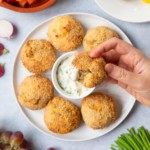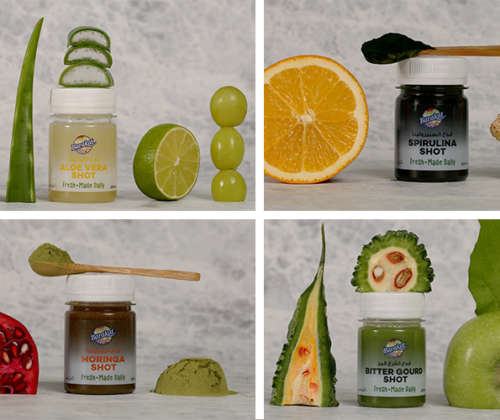Smoked mackerel fishcakes are a winner in so many ways.
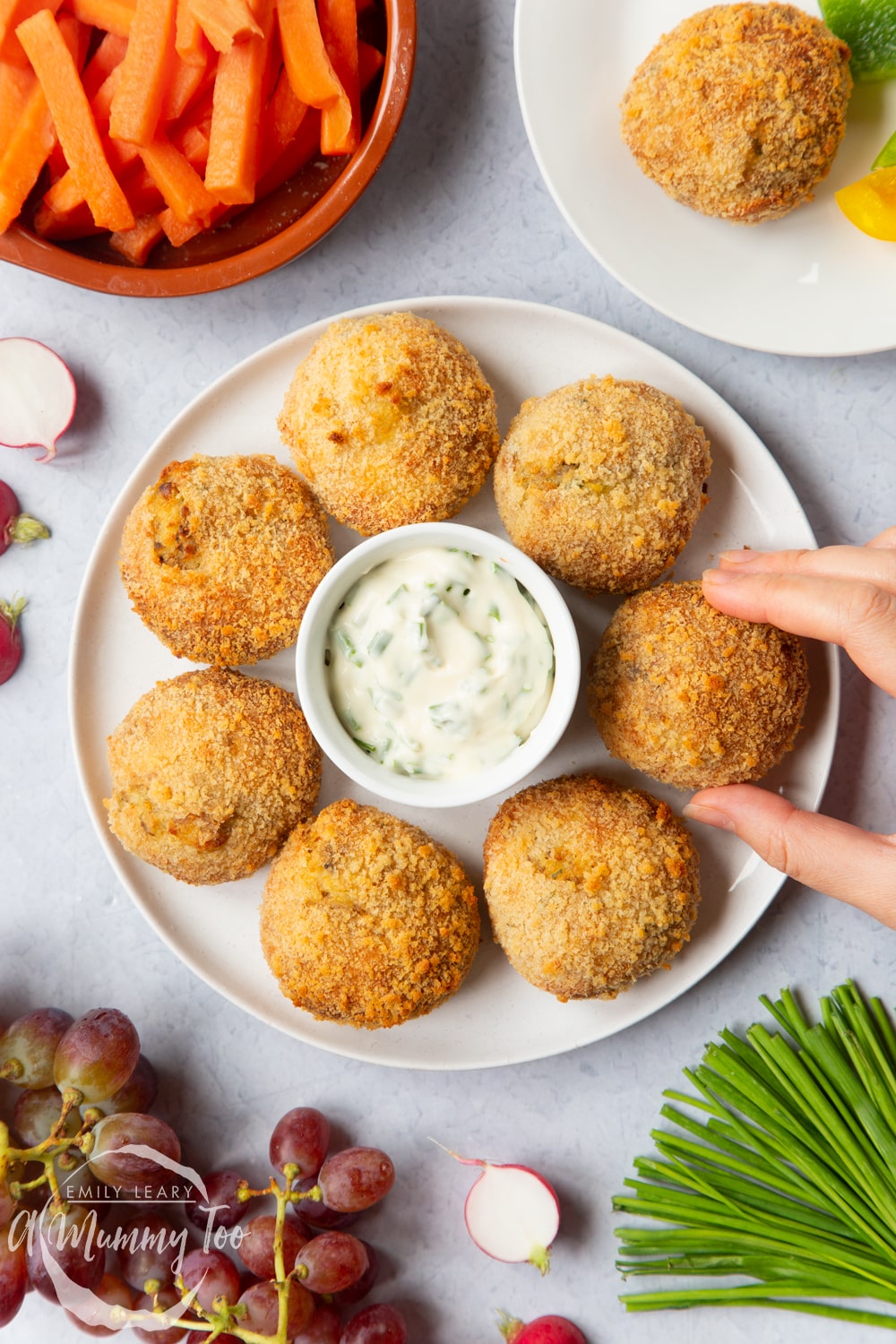
They’re delicious and so a winner with kids. In fact, I find that they’re often loved even by kids who would typically turn their noses up at oily fish.
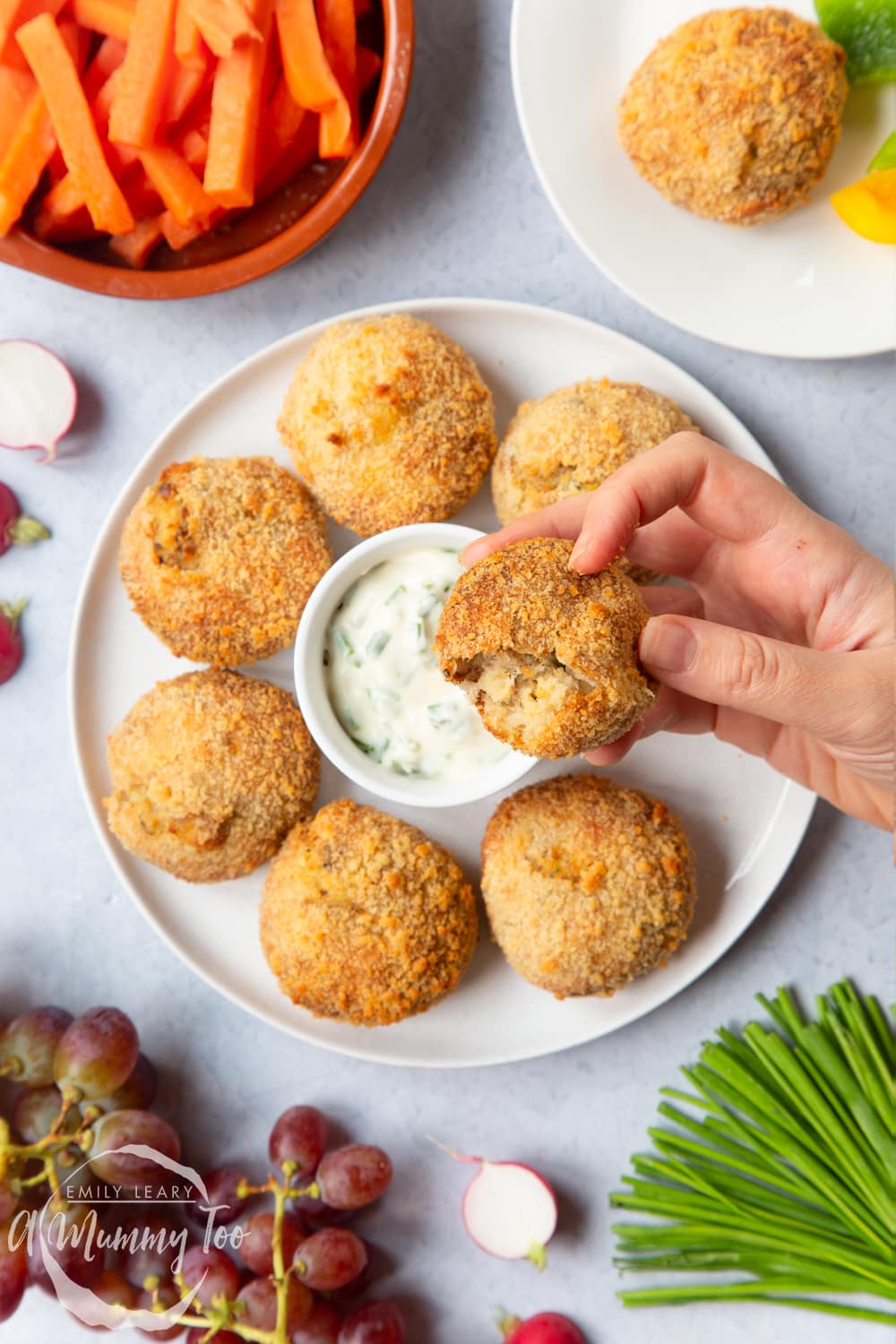
This recipe uses smoked mackerel, potato, chives and a little seasoning to make eight perfect little breaded fish cakes. It’s a recipe passed down from my grandmother, so it’s really special to me and I have fond memories of chomping through these during our family visits!
As it uses leftover mash, this recipe is super cost-effective too, coming in under £1 per person for a two-cake helping.
Since these fishcakes using mackerel, an oily fish, they are also packed with Omega 3.
Oily fish is high in long-chain Omega 3 fatty acids, Docosahexaenoic Acid (DHA) and Eicosapentaenoic Acid (EPA) which help to support a healthy heart. The DHA also helps keep the brain functioning normally and supports normal vision.
Oily fish is also a good source of vitamin D.
The NHS currently recommends that we eat at least one portion of oily fish a week, so this is a great way to help meet that target.
Here’s how to make these mackerel fishcakes.
Ingredients
- 200 g (7.1 oz) smoked mackerel skin removed and flesh checked for bones
- 200 g (7.1 oz) mashed potato
- 1 tsp horseradish sauce
- 1 tbsp chopped chives
- 1 pinch salt and pepper as desired
- 100 g (3.5 oz) plain flour
- 1 tsp paprika
- 2 medium free range eggs
- 100 g (3.5 oz) fresh white breadcrumbs
- olive oil to grease the tray
Equipment
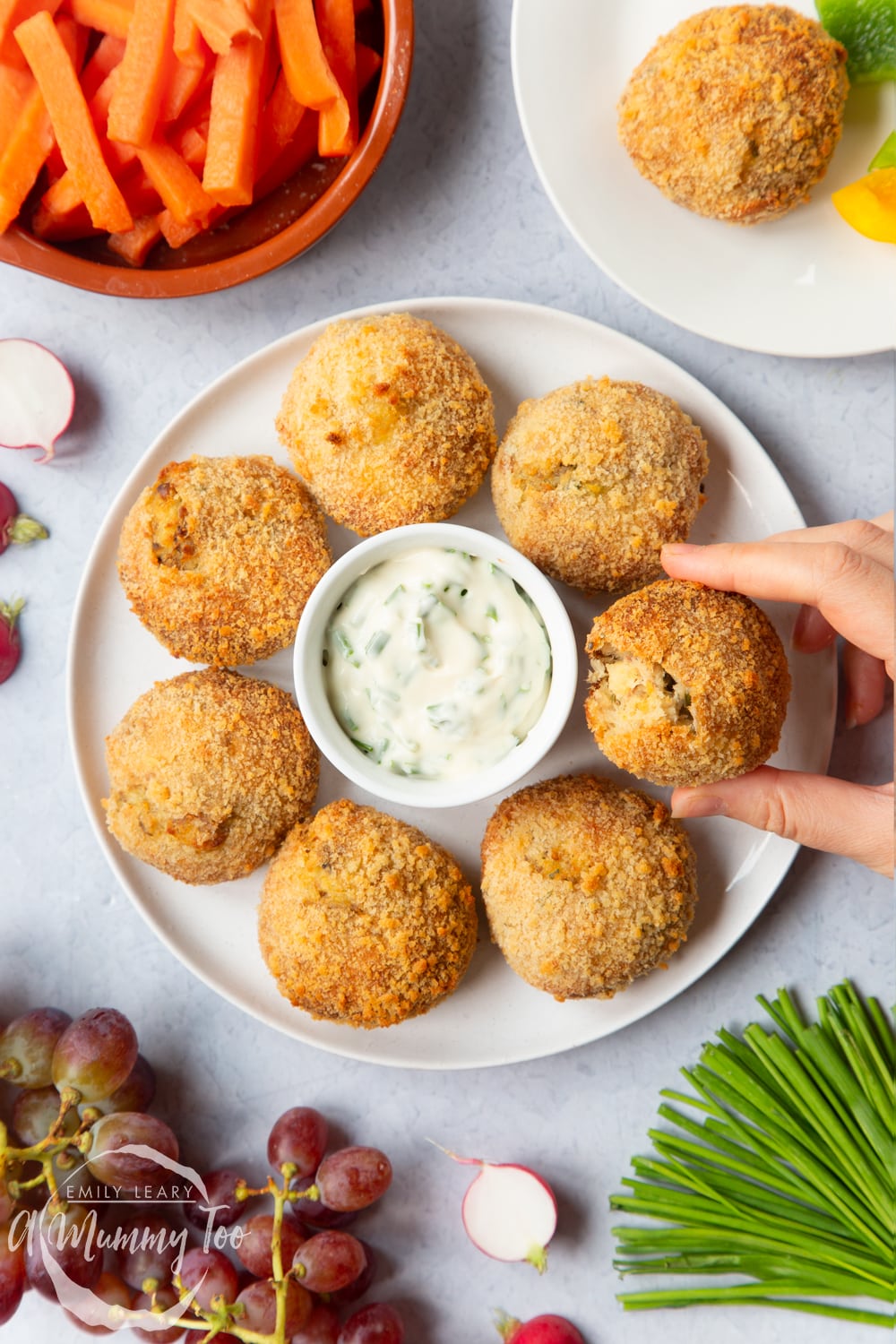
Instructions
Preheat the oven to 200C/390F (180C/355F fan).
Put the mackerel in a bowl and mash with a fork.
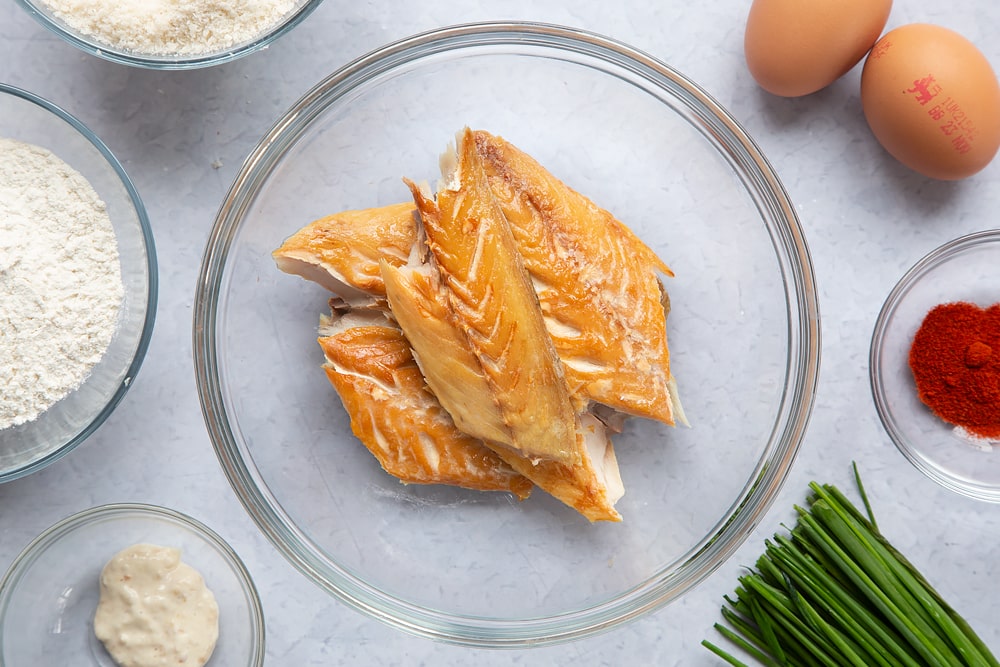
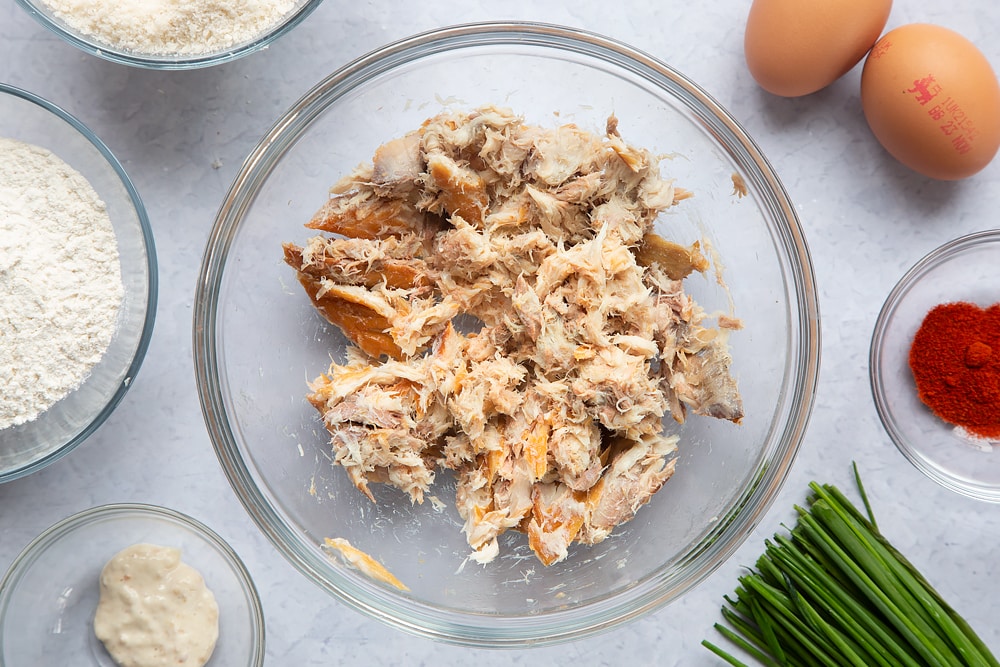
Add the horseradish, chives, salt and pepper.
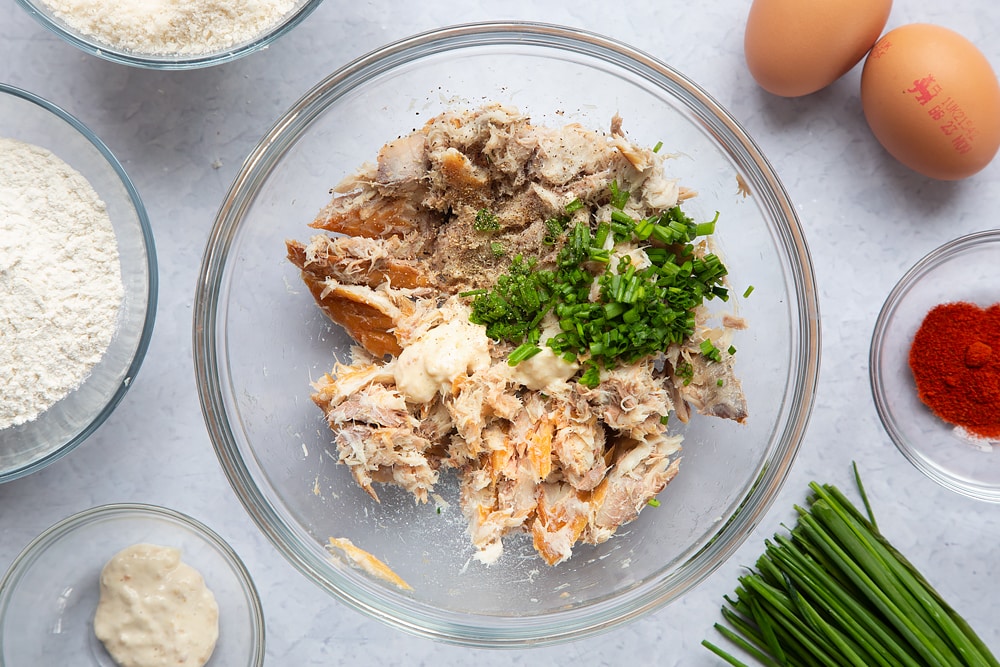
Mix again with the fork until evenly combined.
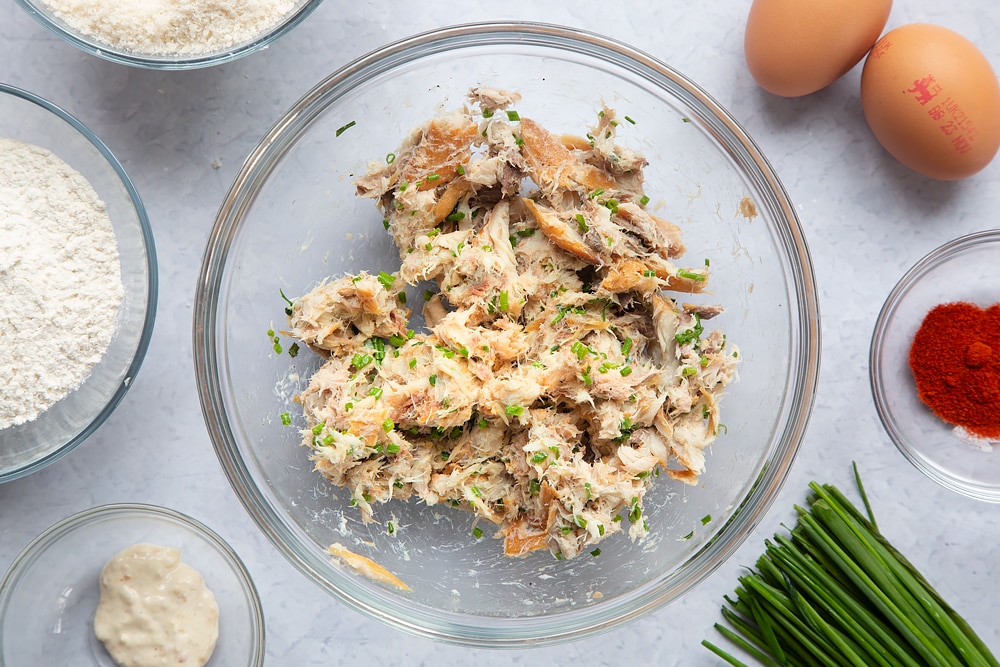
Add the cold mashed potato and mix through.
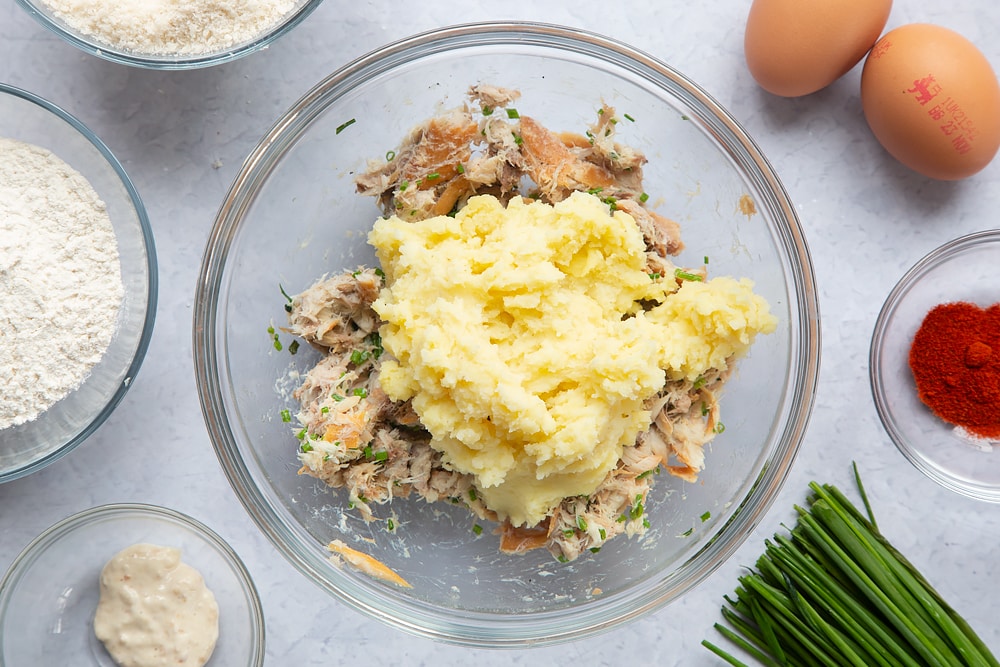
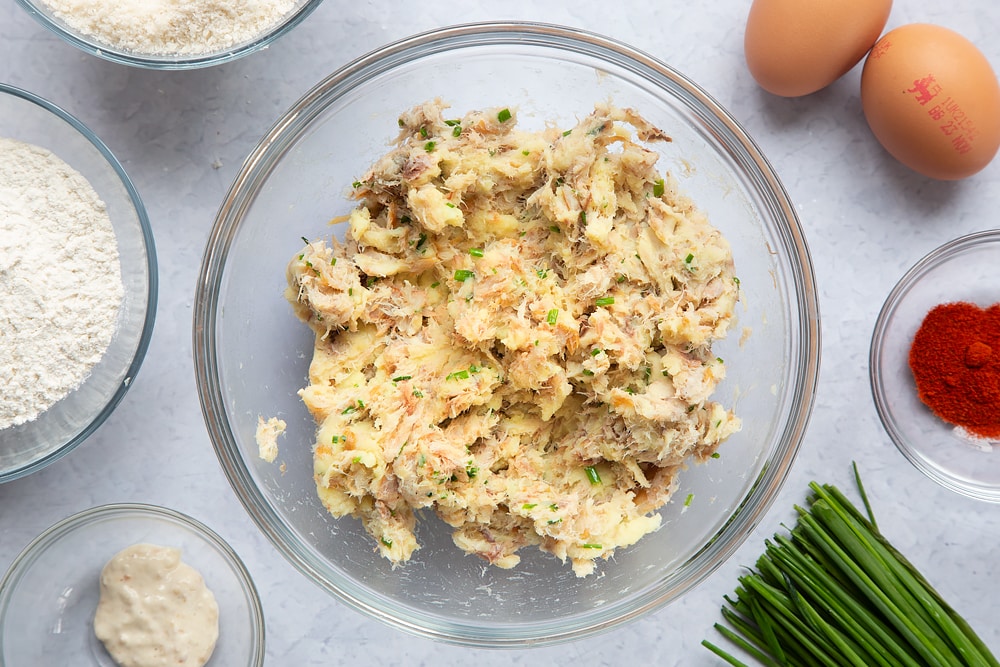
Using your hands, roll the mix into 8 little fish cakes. If you want to be precise, each fish cake should weigh about 50g (1.75 oz).
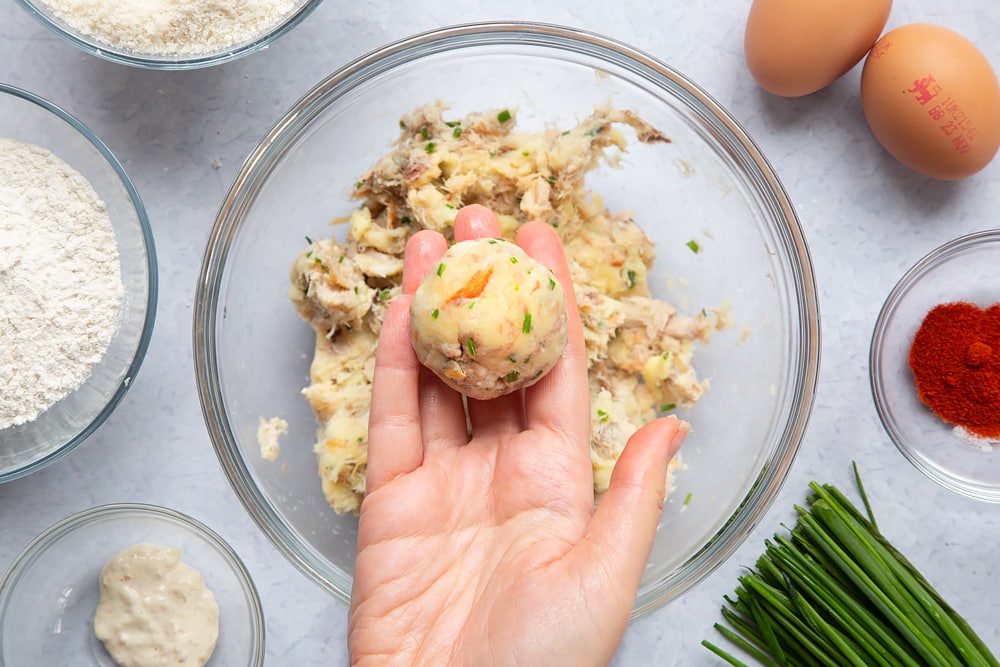
Flatten each fishcake a little with your hand.
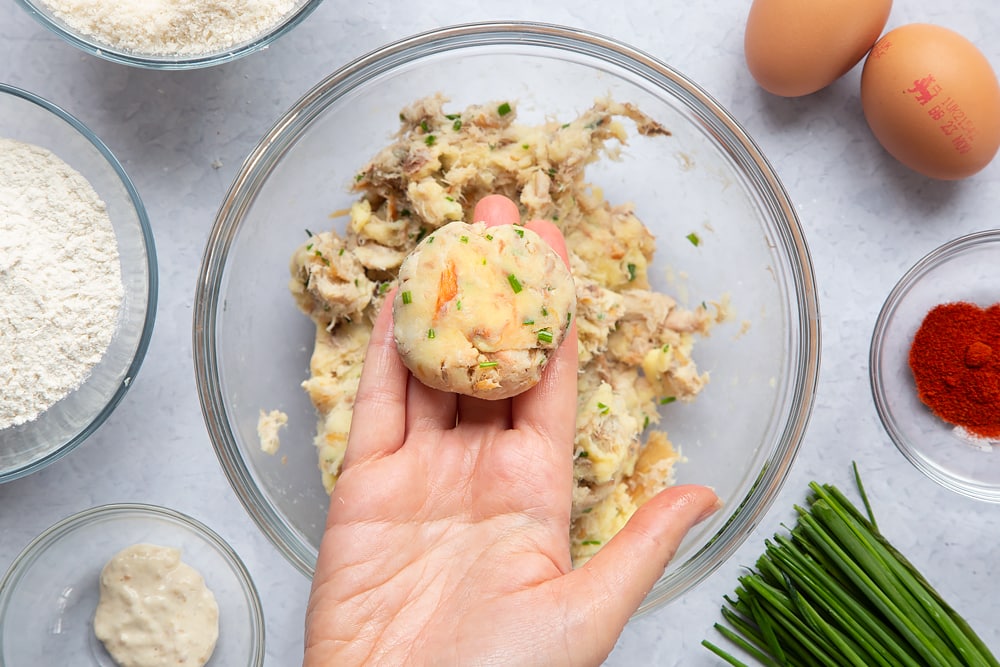
Put your flour in a small bowl and add the paprika. Mix through.
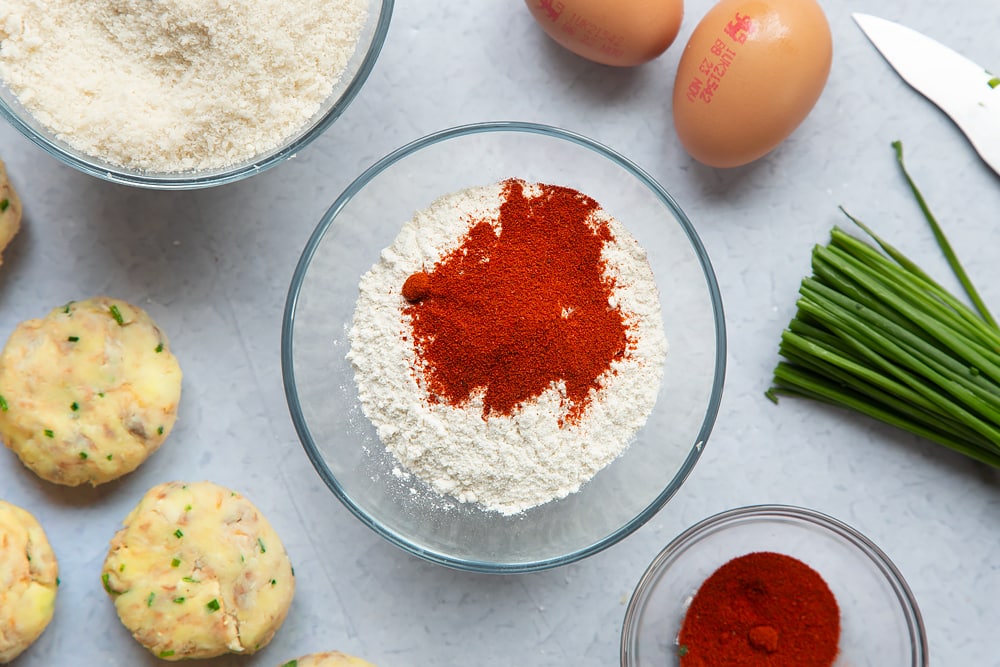
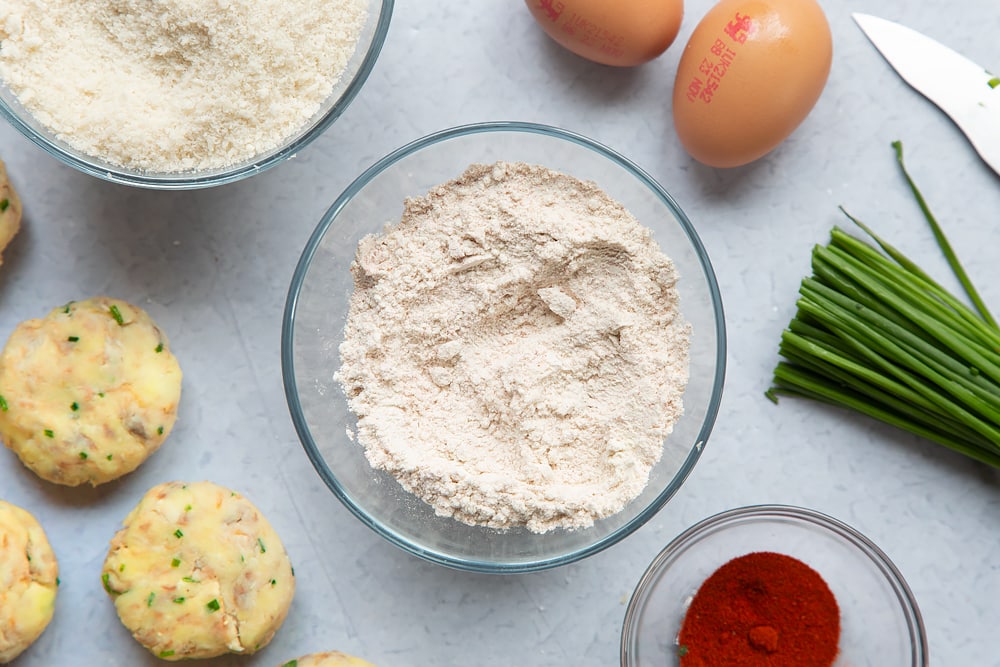
Grab two more small bowls and put the beaten eggs in one and the breadcrumbs in the other.
Dip a fishcake into the flour bowl, coating on all sides. Shake off any excess.
Now dip your fish cakes in the beaten egg, again coating on all sides. Shake off any excess.
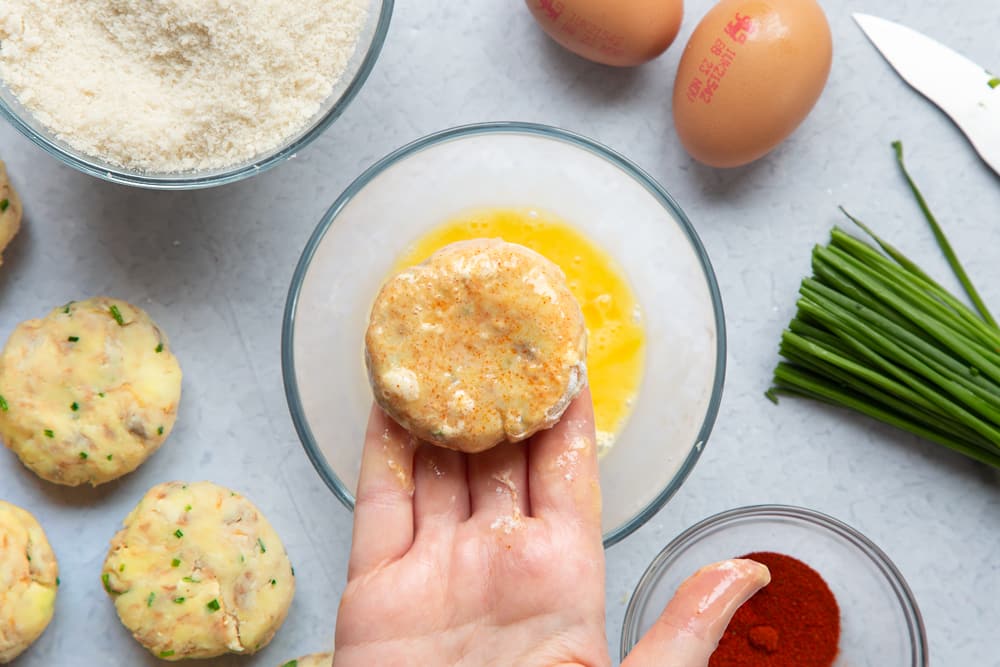
Finally, dip your fish cake in the breadcrumbs, flipping to coat on all sides.
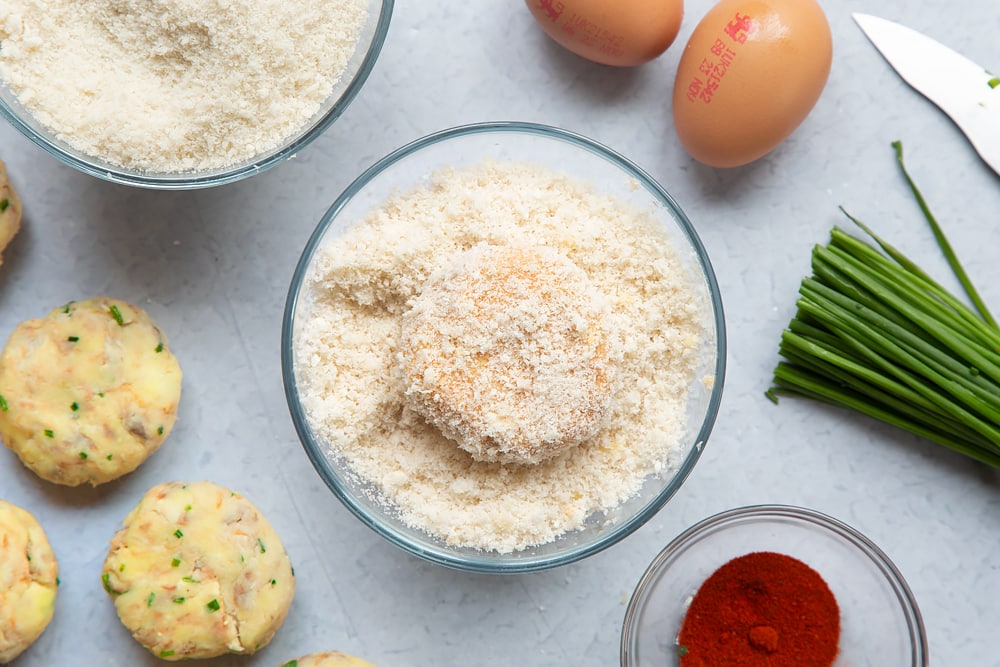
Grease your baking tray with olive oil and place the fish cakes onto the tray as you go, repeating until they are all coated.
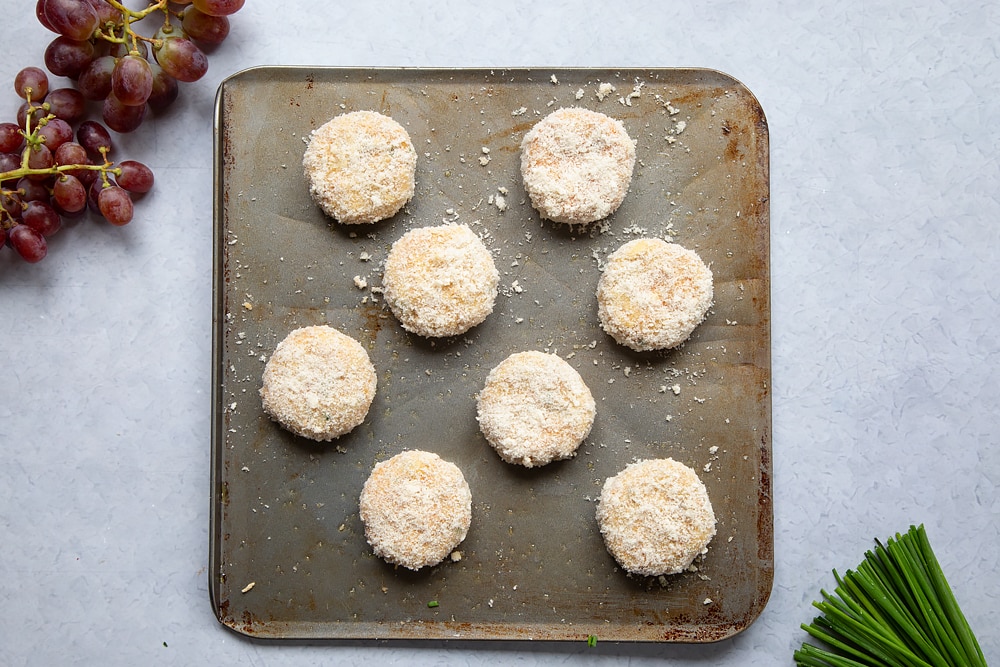
Drizzle or spray your fishcakes with olive oil
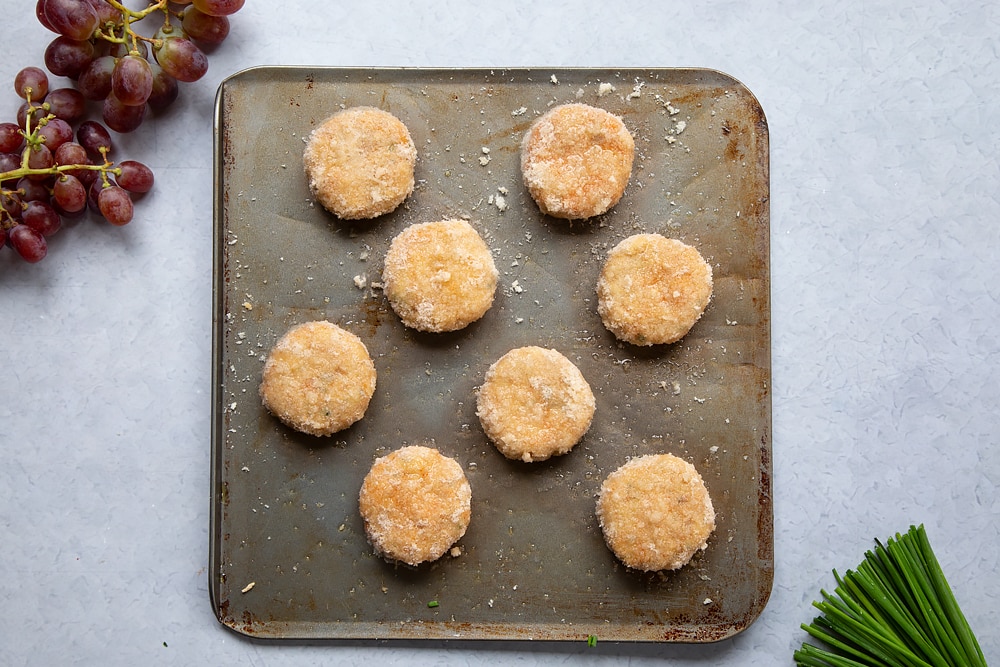
Bake for 25 minutes until golden and slightly risen.
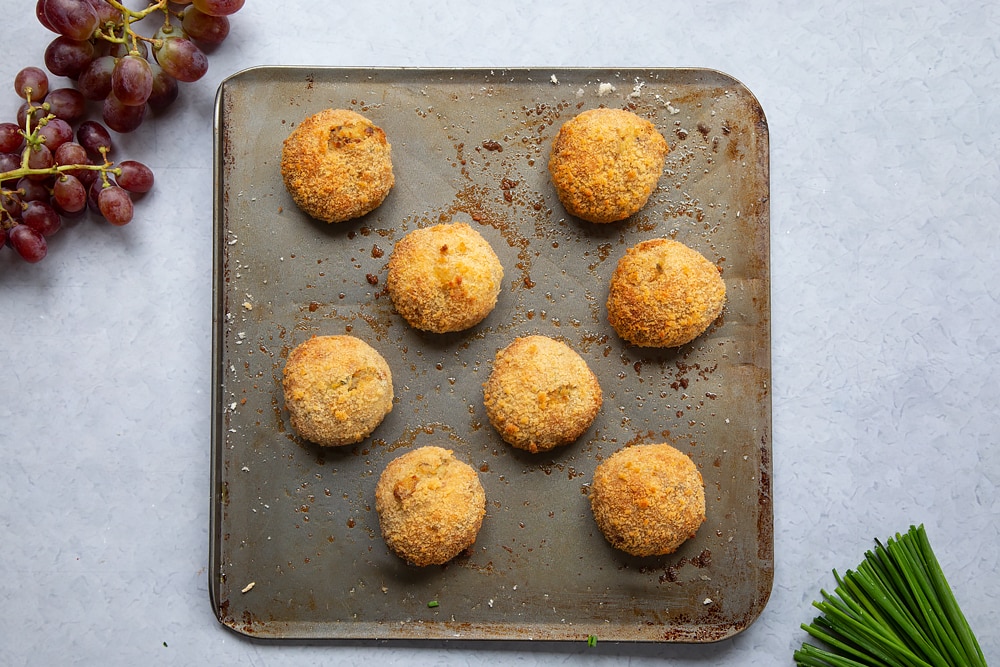
Serve hot or cold.
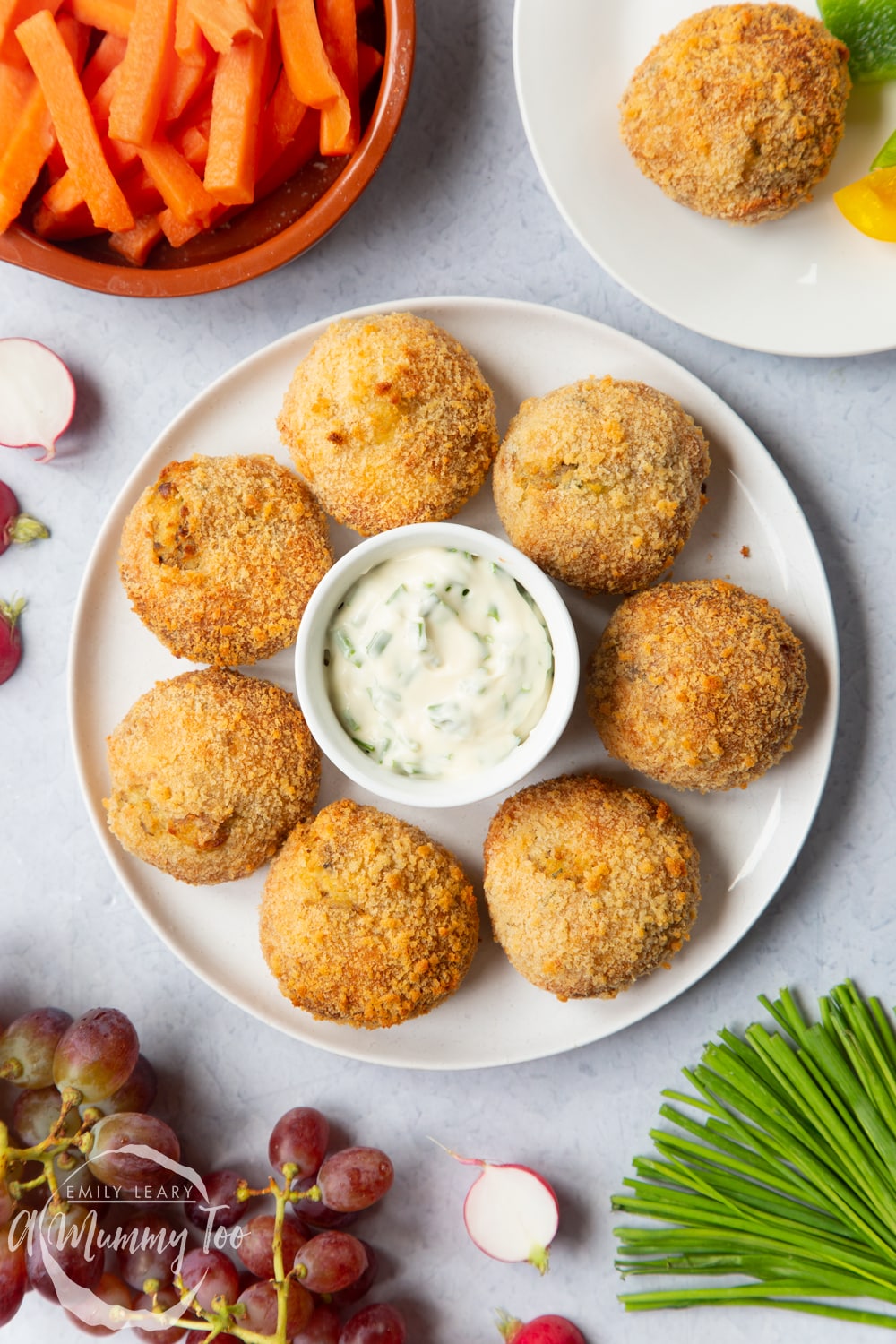
More tips for perfect fish cakes
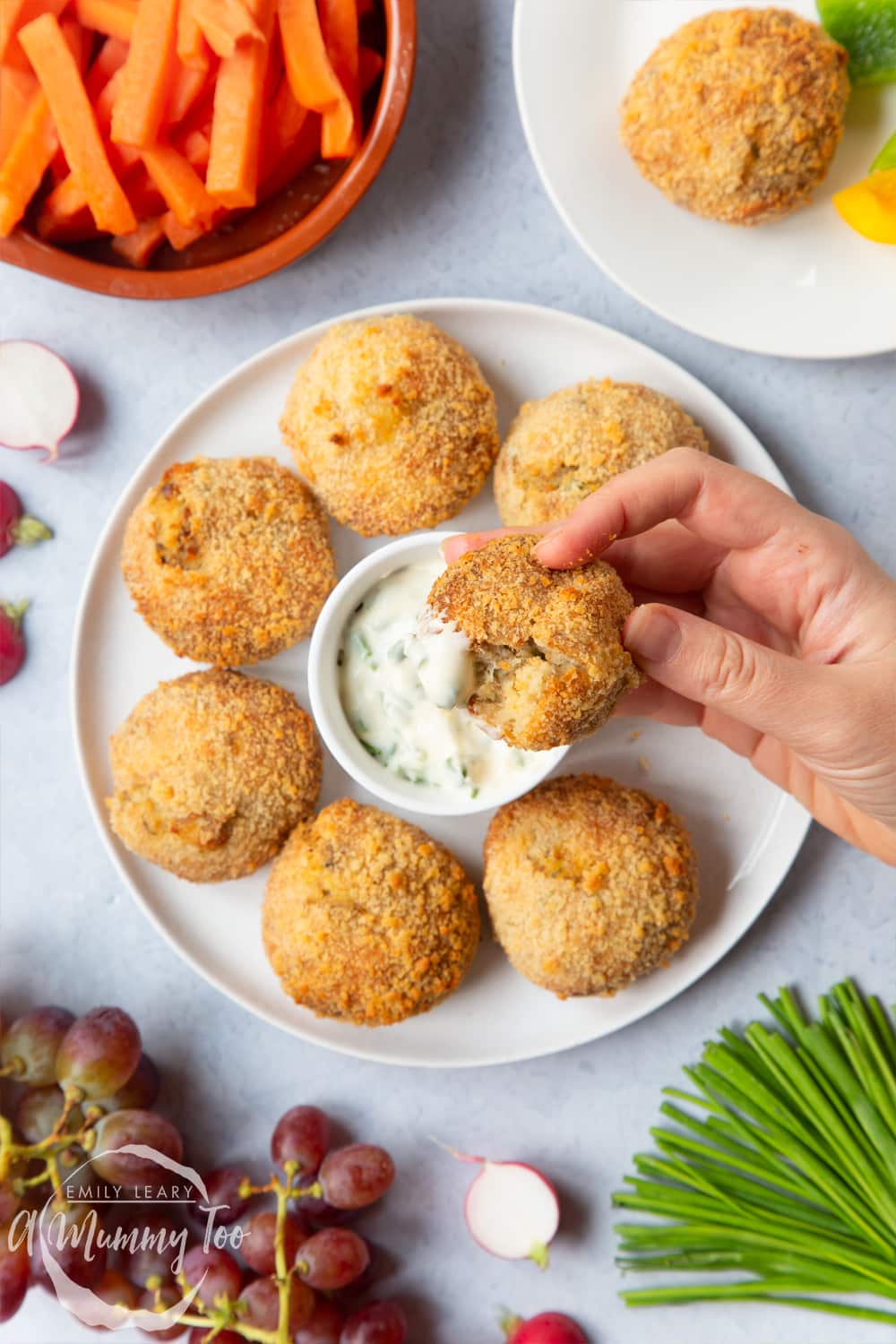
Are mackerel fish cakes suitable for toddlers?
With their delicious, mild flavour these mackerel fish cakes are not only suitable for toddlers, they’re generally a huge hit! Just make extra sure to check for bones in your mackerel.
Can you make mackerel fish cakes without potato?
I haven’t tried it, but I believe it should be possible to make these fishcakes without the potato.
If you do, I would recommend pressing them flatter than usual – more of a patty shape, and be very gentle with them as the potato is what helps bind them.
Please do let me know in the comments if you give it a try!
Can you freeze mackerel fish cakes?
As long as you get them cooled down and into the freezer within a couple of hours of making them, these mackerel fish cakes should freeze well.
Store them in an airtight container and leave them in the fridge overnight to defrost for best results (make sure to eat within 24 hours of thawing in the fridge).
They should also be able to go from freezer to a preheated 180C oven. Put a piece of tin foil over them if you’re worried about burning.
Are mackerel fish cakes healthy?
Mackerel isn’t just a great tasting fish but very healthy too, as are the eggs.
Potato and bread are relatively high in carbohydrates, but these fish cakes are certainly something you can incorporate into a healthy diet, especially if you otherwise struggle to incorporate oily fish into your family diet.
Are mackerel fish cakes keto?
Due to the use of potato, flour and breadcrumbs, these mackerel fish cakes are not keto.
You may be able to forgo the potato, and use coconut flour and keto-friendly breadcrumbs on the outside – let me know if you give it a try.
The horseradish sauce is potentially out too, unfortunately, but you may be able to fit it into your keto diet in moderation.
Can mackerel fishcakes be made in advance?
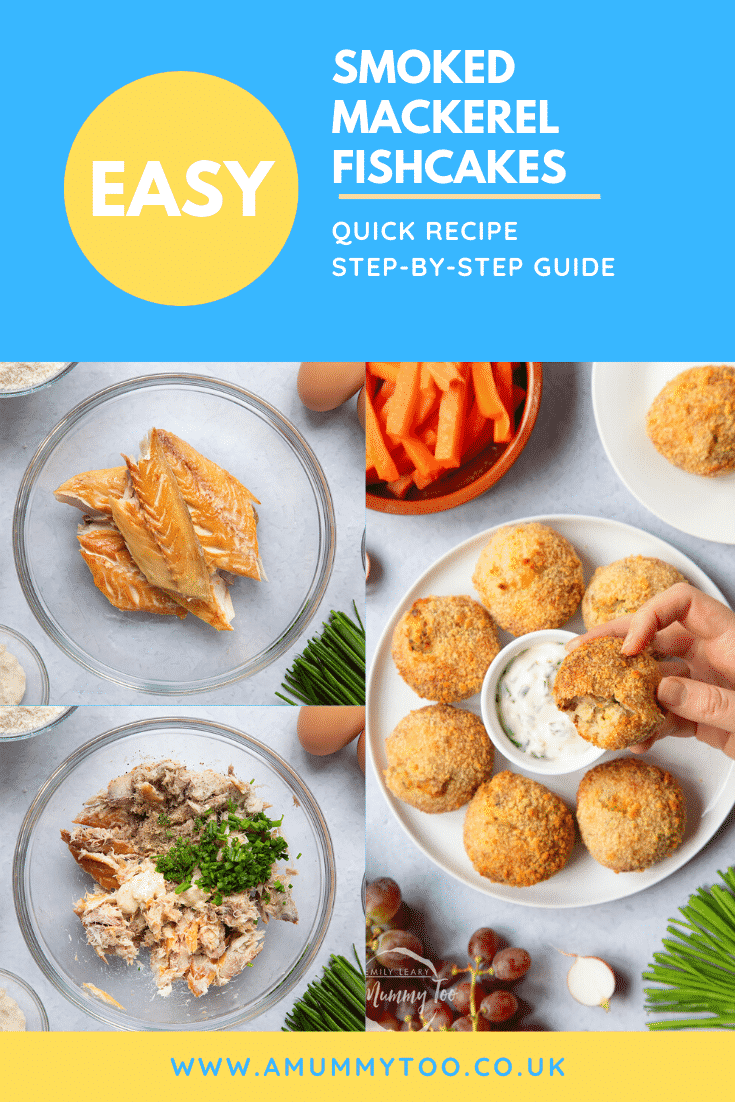
You should be able to make the uncooked fish cakes and store them in an airtight container in the fridge for up to a day before cooking.
It’s best to avoid stacking them as they may stick together so make sure to store in a single later, or use a piece of greaseproof paper between layers.
You could also cook them a day in advance and store them in the fridge overnight ready to be reheated the next day, but you may lose some of the crisp texture of the crumb.
What goes well with fish cakes?
A light salad or soup is my go-to pairing, and the dishes below work especially well.
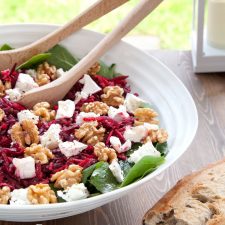
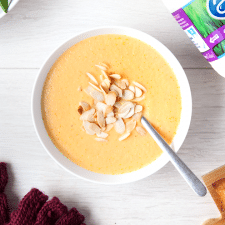
I love this dish what could I do differently with the flavours?
- Acidity. Add a tablespoon of lemon juice to the mix if you want a little extra zing.
- Fish variation. Other oily fish can work too, so if you have any salmon or trout to hand, then use it!
- Cheese. If you’re feeling adventurous, you could also a small amount of cheese to your mackerel fishcake mix. I’d recommend something that isn’t going to overpower the other subtle flavours, so nothing too sharp. Caerphilly, mild cheddar or even a small amount of a young Gruyère would work well.
- Spice. This recipe already has a sprinkling of paprika, plus some heat from the horseradish, but you can always increase the amounts, or even add the flesh of half a chopped chilli if you want a real kick.
Understanding Omega 3
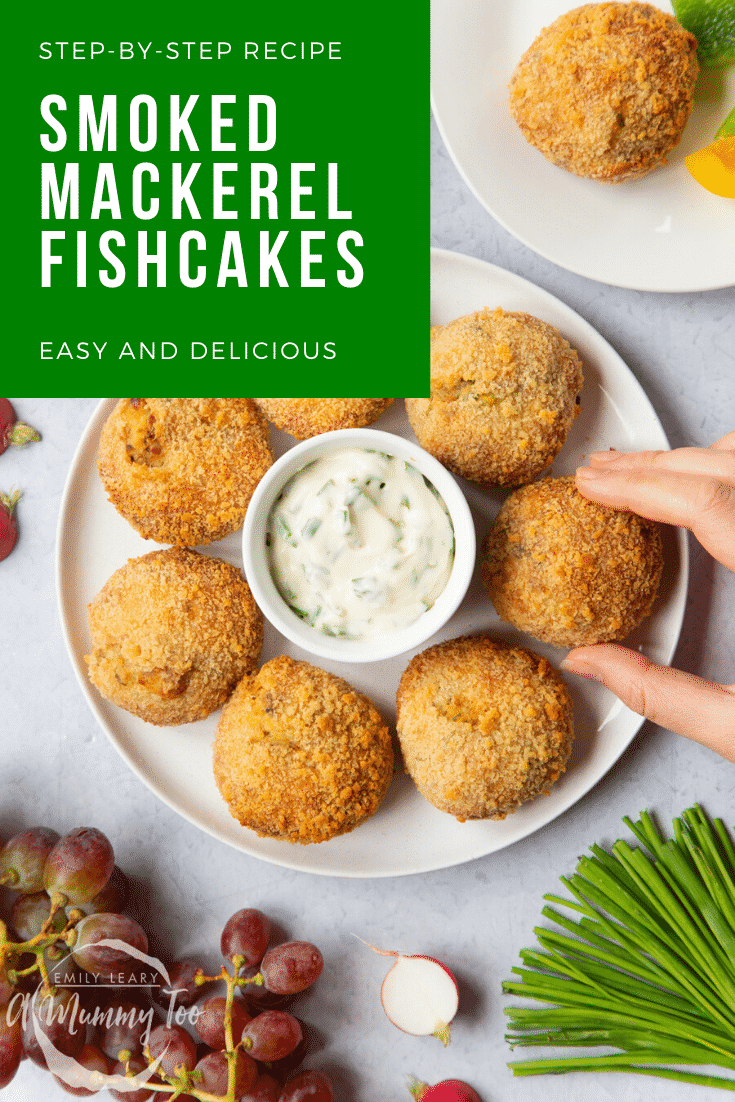
How Omega 3 works
Before we get started, it’s important to remember when reading up on nutrition and the associated advice that not all sources of information are equal! Where you get your information from is important, and I really want to stress that I’m not a nutritionist, doctor or a food scientist.
I’m a cook who’s super interested in how what we eat affects how mind and body, and love to speak to any specialist I can or read whatever research I can find on the matter as time permits.
With that in mind, I’ve teamed up with Efamol, makers of super high-quality fish oil supplements, to share the most accurate info possible.
Here are some facts for starters:
- Our understanding of human physiology has never been better.
- Our understanding of how our diet affects our physiology has never been better.
- Having said that, we are still not fully sure of how the body works, nor do we yet have a full picture of how our dietary choices affect our health. Scientists are working all the time both in the lab and out in the field to get more data, which is a complex process.
- Omega 3 fatty acids are found in many natural food choices and play differing roles in the healthy functioning of our bodies.
- Omega 3 fats are polyunsaturated rather than saturated, like the fats that you find in butter and meat – and coconut oil. Three types main types of Omega 3 include: Alpha-linolenic acid (ALA), which is found in plant oils and seeds such as walnut oil or flaxseeds, and EPA and DHA, which are most commonly found in marine oils.
- Not all Omega 3 sources, be they from natural food choices or in a supplement form, are equally beneficial for you.
The benefits of Omega 3
These are the areas most commonly researched around the benefits of Omega-3:
- Brain function. This is an area of active study as DHA is a crucial component of normal brain function and vision and the most abundant Omega 3 in the brain.
- Cardiovascular system: Omega 3 fats EPA and DHA help keep the heart functioning healthily. If you have 3g of EPA and DHA a day, this combination can help keep blood pressure normal, and 2g a day helps keep blood triglyceride levels normal.
Can you take Omega 3 supplements when pregnant
Whether you can take Omega 3 supplements depends on that particular supplement and what it contains. Watch out for Cod liver oil which can contain Vitamin A, you should be especially careful with Vitamin A in pregnancy.
Always consult a medical professional before taking any supplements when you take any medication or if you have an existing medical condition, AND it is especially important while pregnant.
Find out more about Efamol
This October Efamol® has introduced two new products to make it easy for adults and children to supplement the Omega 3 in their diets*. Formulated with little ones in mind NEW Efamol® Omega 3 DHA Drops are a simple and effective way to top up your child’s Omega 3 levels. Suitable for babies and children as they progress through school, a 1ml drop will help to support your child’s healthy brain function and vision.
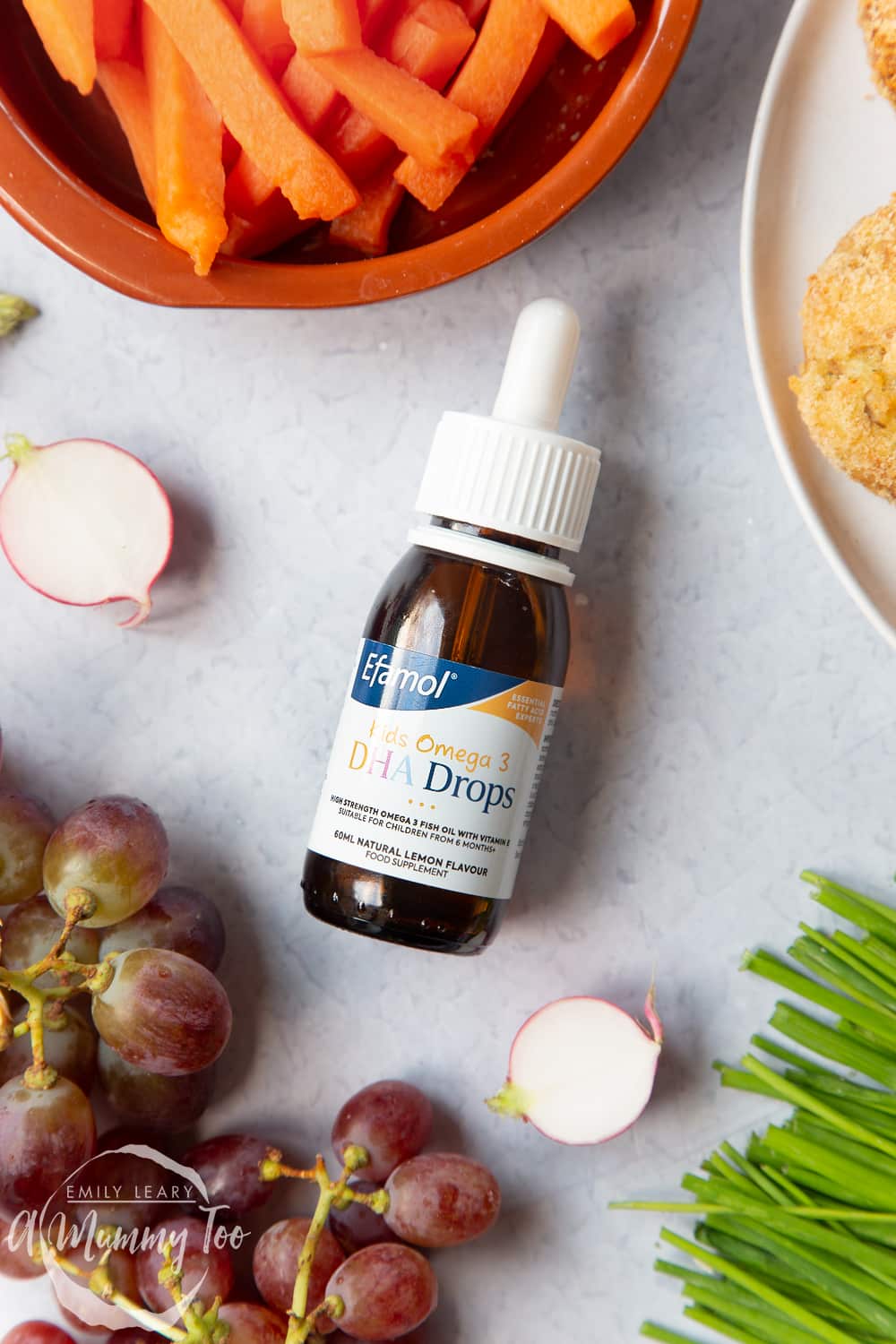
Each 1ml drop contains 400mg of DHA, well over the minimum amount of 250mg needed to gain the beneficial effect. With no fishy taste, sugar free and a natural mild lemon flavour they can be dropped straight in the mouth or they can easily be hidden in food, helping to give your little bundle of joy a healthy start.
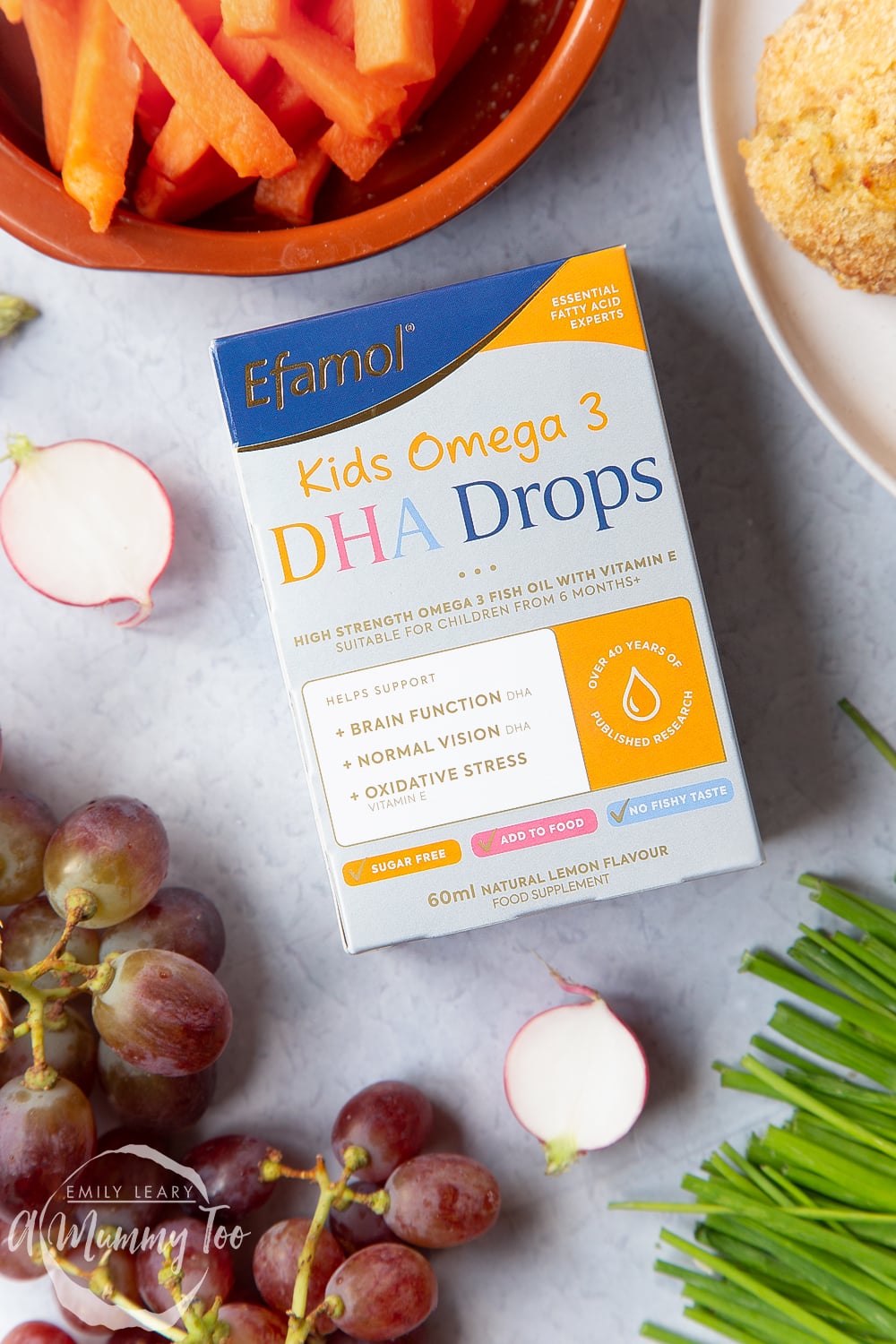
These innovative, high strength drops are sugar-free and their formula will give mums extra confidence that their child is getting DHA through their diet, especially if they are struggling to eat the recommended amount of oily fish. The good news is that these drops are suitable for any age from 6 months plus, so mum, dad and siblings can drop DHA into their morning cereal or yogurt too.
Efamol® Omega 3 DHA Drops is part of the growing Efamol® range from the Essential Fatty Acid (EFA) experts, which is also launching a new Efamax™ High Strength Pure Fish Oil, which contains DHA to support brain function and vision. In addition, the combination of both EPA and DHA supports normal heart health. This ultra-strength formula has been formulated with fish oil that contains 80% DHA and EPA. For over 40 years Efamol® has led the international field in the scientific research and development of EFA food supplements.
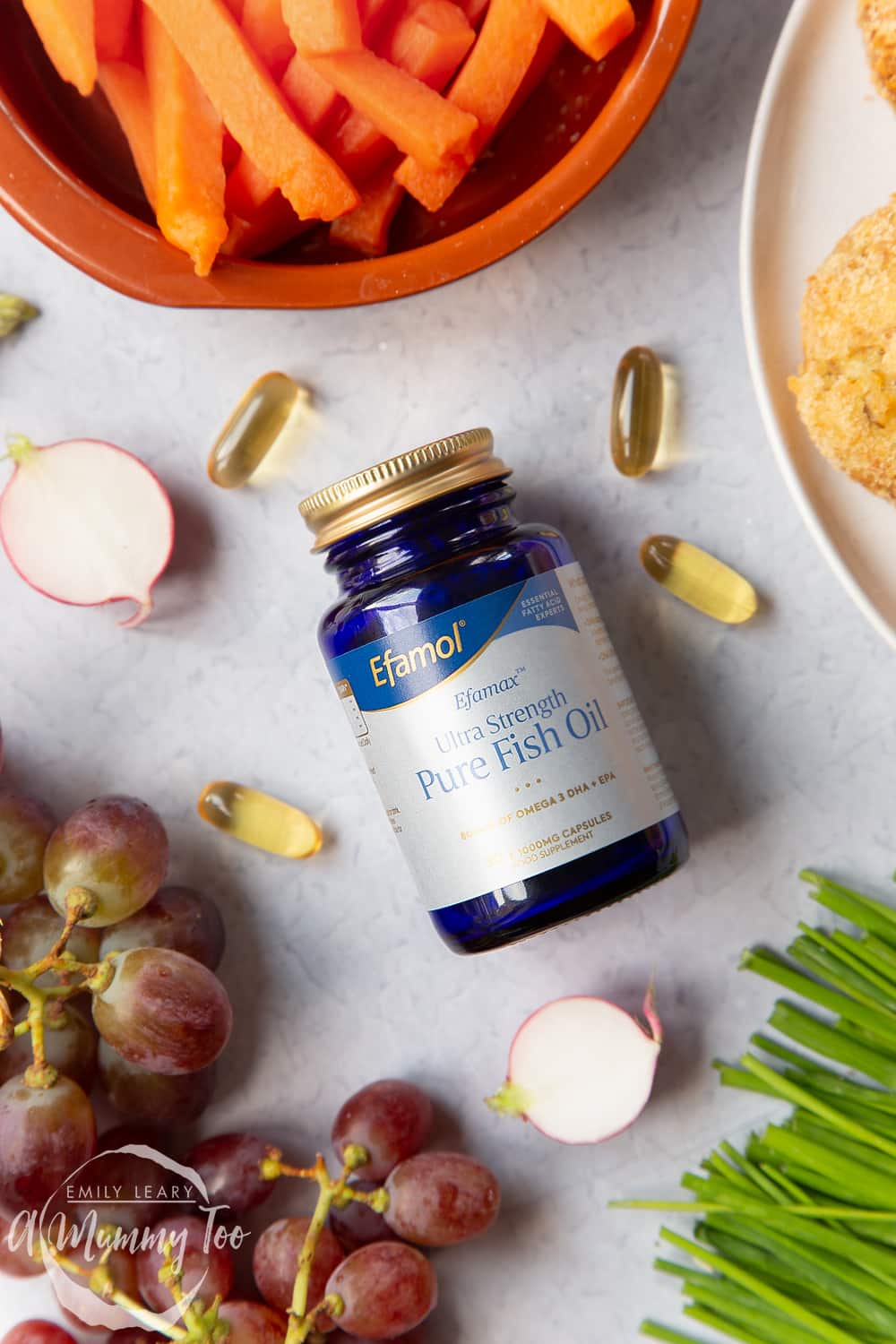
Efamol® Omega 3 DHA Drops (£13.99) and Efamax™ High Strength Pure Fish Oil (£13.99) are available from www.efamol.com as well as Amazon, Boots the Chemists, Health Food Stores and Independent Pharmacies.
Food supplements are intended to supplement the diet and should not be used as a substitute for a balanced diet and a healthy lifestyle.
Efamol®’s New Research
A major new survey by Efamol® (www.efamol.com) reveals that the UK population is under consuming oily fish with 60% saying they haven’t eaten it in the last week and a quarter (25%) saying they haven’t eaten it in the last six months. A fifth of those surveyed (19%) never eat it.
Furthermore, Brits seem to be confused about what oily fish actually is – 82% of the population think that tinned tuna is an oily fish or are unsure. Brits seem to believe it counts as the one portion of oily fish they should be eating per week when according to NHS guidance, it isn’t. However, it is easy to see where the confusion lies as tinned tuna does contain Docosahexaenoic Acid (DHA) and Eicosapentaenoic Acid (EPA) just at a much lower level than other fish such as salmon.
Yet the irony is we know it’s good for us, with 70% recognising that oily fish is good for brain health and 65% understanding it is good for heart health. However, it seems there are many barriers to cooking it and eating it including; the taste, texture, the smell it creates in the kitchen and the cost. There is also a reluctance to stray away from popular choices such as salmon and mackerel to experiment with other varieties such as anchovies and pilchards.
Emma Doswell, Efamol® Wellbeing Expert comments, “The NHS guidelines to eat two portions of fish every week, including one portion of oily fish as part of a healthy, balanced diet exist for good reason. While people broadly understand that this is the case, this research clearly shows that people still aren’t eating as much as is recommended.
Print this mackerel fish cakes recipe
Fancy trying these mackerel fishcakes for yourself? Let me know if you do! Here’s the recipe in printable form.
Smoked mackerel fishcakes
Ingredients
- 200 g (7.1 oz) smoked mackerel skin removed and flesh checked for bones
- 200 g (7.1 oz) mashed potato
- 1 tsp horseradish sauce
- 1 tbsp chopped chives
- 1 pinch salt and pepper as desired
- 100 g (3.5 oz) plain flour
- 1 tsp paprika
- 2 medium free range eggs
- 100 g (3.5 oz) fresh white breadcrumbs
- olive oil to grease the tray
Instructions
-
Preheat the oven to 200C/390F (180C/355F fan).
-
Put the mackerel in a bowl and mash with a fork.
-
Add the horseradish, chives, salt and pepper.
-
Mix again with the fork until evenly combined.
-
Add the cold mashed potato and mix through.
-
Using your hands, roll the mix into 8 little fish cakes. If you want to be precise, each fish cake should weigh about 50g (1.75 oz).
-
Flatten each fishcake a little with your hand.
-
Put your flour in a small bowl and add the paprika. Mix through.
-
Grab two more small bowls and put the beaten eggs in one and the breadcrumbs in the other.
-
Dip a fishcake into the flour bowl, coating on all sides. Shake off any excess.
-
Now dip your fish cakes in the beaten egg, again coating on all sides. Shake off any excess.
-
Finally, dip your fish cake in the breadcrumbs, flipping to coat on all sides.
-
Grease your baking tray with olive oil and place the fish cakes onto the tray as you go, repeating until they are all coated.
-
Drizzle or spray your fishcakes with olive oil
-
Bake for 25 minutes until golden and slightly risen. Serve hot or cold.
Video
Nutrition
* Note: nutritional information is estimated, based on publicly available data. Nutrient values may vary from those published. Cuisines identify the primary region of inspiration for a dish.
Pin this mackerel fish cake recipe for later
I loved these fish cakes, what other recipes can I try?
If you liked these fish cakes you’re bound to love any of these fish-based recipes!
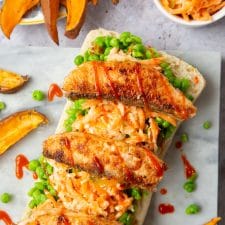
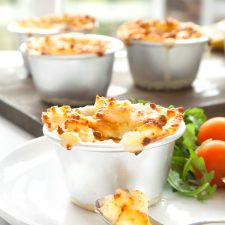
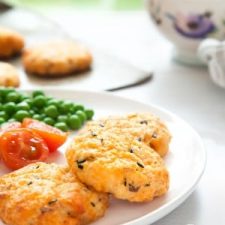
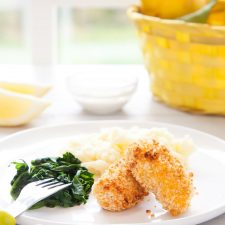
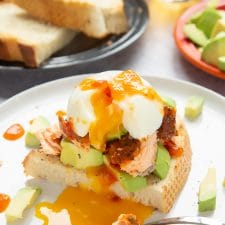
Get Your Kids to Eat Anything
My debut cookbook, Get Your Kids To Eat Anything is available now from all good bookshops!
It’s so much more than a cookbook, it’s a 5-Phase programme designed to take you through a meaningful, simple and sustainable journey to end fussy eating.

Since its release in March 2019 Get Your Kids To Eat Anything has been changing mealtimes in households across the country and has become an Amazon #1 best-seller.

